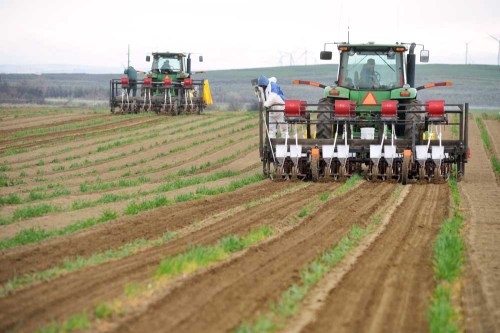Oregon Democrats’ proposal would extend overtime rights to farmworkers; farmers say it would threaten industry
Published 7:00 am Tuesday, March 30, 2021

- River Point Farms workers plant onion seeds March 17, 2015, in a field near County Line Road west of Hermiston. The Oregon House on Tuesday, March 1, 2022, voted 37-23 to end the state’s agricultural exemption from higher overtime wages.
SALEM — It’s not uncommon for Javier Ceja Manzo to work more than 10 hours a day harvesting crops in Woodburn.
In his decades as a farmworker, he has worked in extreme heat, heavy rain and snow. Like many other Oregon farmworkers, he didn’t miss a day of work during the wildfires in September 2020, despite the air quality reaching hazardous levels.
Yet, he doesn’t receive overtime pay during those long work days, and he said he can barely cover his basic expenses with the income he does take home.
Democrats in the Oregon Legislature are trying to change that situation. A House bill introduced in January would require employers to pay farmworkers overtime if they work more than 40 hours in a week, the same rights that most nonfarm workers in Oregon already enjoy.
But the bill faces strong opposition from farmers, who say they operate on thin profit margins and that the requirement could threaten Oregon’s agriculture industry. The added wages could potentially put small farms out of business and lead to fewer shifts and less pay for Oregon’s estimated 174,000 migrant and seasonal farmworkers, lobbyists for farms and nurseries say.
Advocates, meanwhile, say overtime pay for farmworkers is long overdue and a matter of racial justice and equity. Studies estimate that more than 90% of Oregon farmworkers are Latino.
“Every dollar is very important to pay what is necessary,” Manzo wrote in testimony supporting the bill. “We do not have the privilege of taking our family to a restaurant or buying gifts for our children. We also do not have time to spend with our children. We are forced to work without having opportunities.”
‘We can’t continue to ignore this’
While the majority of hourly employees in the United States receive time-and-a-half pay for the hours they work beyond 40 hours a week, farmworkers were intentionally excluded from that mandate back when the Fair Labor Standards Act passed in 1938.
Oregon farmers say that exclusion makes sense because the work farmworkers do is usually seasonal, with many working long hours during the harvest season and going from farm-to-farm to get in the most work possible before the need dries up later in the year. Unlike in other industries, agricultural employers often pay to house migrant farmworkers, which comes at a significant cost, even though the housing is rustic and cramped compared to standard housing.
But the origins of the overtime exclusion are also steeped in the racism of the Jim Crow era. In the 1930s, Southern lawmakers agreed to support the progressive federal wage and labor legislation only if agriculture workers, at the time many of whom were Black, were exempt from the requirements.
“We can’t continue to ignore this,” said Rep. Andrea Salinas, D-Lake Oswego, who is one of 11 Oregon Democrats sponsoring the bill. “Looking back at the history of the Fair Labor Standards Act and why agriculture was exempt in the first place, it really was a matter of race. It was a racial injustice meant to keep Black people a part of slave labor. For me, this is about trying to reckon with that past and making sure we are building a future that’s more equitable.”
To this day, the majority of states do not require that farmworkers receive overtime pay. But there has been some momentum toward changing that over the last five years.
Wage would be based on how much is harvested
California became the first state to require overtime pay for farmworkers in 2016, but didn’t begin phasing in the new rules until last year. New York, Minnesota, Hawaii and Maryland have joined California in requiring overtime pay for farmworkers in certain situations. And in November 2020, the Washington Supreme Court ruled that dairy workers were entitled to overtime pay, a decision expected to be applied to the state’s entire agriculture industry.
Oregon’s bill would require that farmworkers receive time-and-a-half pay for hours they work beyond 40 hours a week, or receive one and a half times their regular price for any overtime hours if they are paid on a piece-rate basis, meaning they earn a wage based on how much they harvest. Workers in food processing facilities are already afforded the right to overtime pay.
Sen. Chuck Thomsen, R-Hood River, who owns a pear orchard, said the bill would ultimately hurt not only farmers, but the farmworkers whom it’s intended to help.
He said the workers whom he houses for free at his orchard work long hours six days a week over several weeks while the pears are being harvested. They can also go to other farms during the season to maximize their income at the busiest time of the year. He said he pays workers based on the amount they harvest and that some make upward of $300 per day during the harvest season.
If the bill passes, he said he will have to limit his employees’ weekly hours. That would reduce their weekly earnings.
“People think this will help, but it will actually hurt employees,” Thomsen said. “The bill isn’t good for the employers or the employees.”
However, workers, unions and advocacy groups have begged to differ. Many submitted testimony ahead of a public hearing on March 8. Another hearing is scheduled for next week.
Martha Sonato is the political director at PCUN, Oregon’s largest farmworker union. She said farmworkers often sacrifice their own long-term well-being to do the hard labor that others don’t want to do, yet they still struggle to get by on meager wages.
She said those workers deserve to be treated with the same respect and afforded the same protections as other workers.
“I hear this will cost the agriculture industry thousands of dollars each year, but the way I look at that is those are thousands of dollars that are coming from the pockets of farmworkers,” Sonato said. “For many generations, the agriculture industry has benefited largely from cheap labor and it’s time for farmworkers to no longer subsidize this industry.”
‘It’s not equitable, it’s not fair’
A report commissioned by the U.S. Department of Labor found that the average farmworker was making only between $17,500 and $19,999 per year in 2016. While many farmworkers are required to receive at least minimum wage, there are some exceptions for small farms. The minimum wage has been increasing slightly in Oregon each year since 2016, with different rates adopted for different parts of the state.
Jenny Dresler, a lobbyist for the Oregon Farm Bureau, said those minimum wage increases have already been squeezing Oregon farmers and that those employers simply can’t afford to absorb the added cost of paying their workers overtime.
Approximately 91% of 544 agricultural employers surveyed by the farm bureau said they would be unable to afford the cost of complying with an overtime mandate without significantly changing their operation. If Oregon lawmakers vote to require overtime pay, Dresler said farmers may have to grow crops that are less labor intensive, replace workers with machines when possible, reduce their workforce, hire new temporary workers so they can limit the schedules of their current employees to 40 hours per week, or even leave Oregon.
Lesley Tamura is among the Oregon farmers who says that the bill would threaten her business. Even now, she said the farm barely breaks even in a good year.
Tamura owns a 40-acre pear orchard in the Hood River Valley that has been in her family for four generations. She said farms like hers work on thin profit margins because they don’t set the price of their products. Instead, the grocers they sell to set the price and have the ability to purchase fruit and produce from out of state or abroad if local farmers try to set higher price points.
“That’s money that we just don’t have,” Tamura said. “This bill as it is currently written is an existential threat to Oregon agriculture.”
California, Oregon and Washington are the nation’s largest pear producers by far. How the overtime mandate will impact California’s agriculture industry is not yet clear because the state only began phasing in its requirements last year. California farms who employ more than 25 employees are currently required to pay overtime to farmworkers who work more than 50 hours in a week.
Salinas said she is sympathetic to the concerns raised by farmers. She is in the process of introducing an amendment to the bill that would allow Oregon’s overtime requirements to be phased in over three years, with overtime pay only being required in the first year when employees work more than 50 hours in a week. She said additional subsidies may be needed to offset the costs for small farms as well.
But she said the concerns of farmers shouldn’t stop lawmakers from taking steps to right an injustice.
“We have 174,000 farmworkers that should not be excluded from the ability to get overtime pay,” Salinas said. “It’s not equitable, it’s not fair.”









